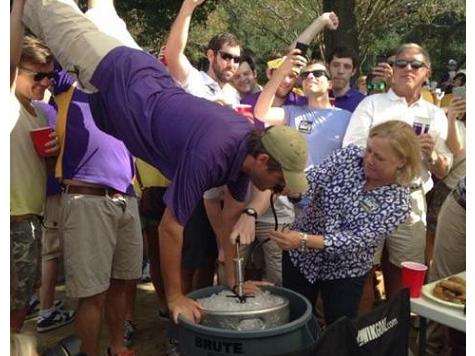A new poll from left leaning Public Policy Polling (PPP) shows Representative Bill Cassidy (R-LA) has a slight lead over incumbent Senator Mary Landrieu (D-LA) in a two person race in Louisiana’s U.S. Senate contest.
The poll, conducted of 1,141 likely Louisiana voters between September 25 and September 28, shows that in a two person runoff, Cassidy leads Landrieu by three points, 48% to 45%. The poll’s margin of error is 2.9%.
While polls in all other states with Senate races focus exclusively on the November general election, the new PPP poll measures voter preferences in the anticipated December runoff whose two contenders will be determined by the results of the November “jungle primary,” which is open to all candidates regardless of party affiliation.
According to Louisiana election law, if no candidate receives 50% plus one vote in the jungle primary, the top two vote getters meet again in a December runoff.
The same PPP poll shows that Landrieu leads Cassidy by 42% to 34% in the jungle primary, with retired Colonel Rob Maness, a Republican, lagging far behind with only 12% of the vote, despite recently receiving an endorsement in May from Sarah Palin.
PPP concluded that “Maness continues to be no real threat to Cassidy’s chances of finishing in the top two- he is now 22 points out of second place compared to 19 points back on our late July poll.”
Voters in Louisiana appear to lack enthusiasm for any of the three leading candidates. All three have higher unfavorable then favorable ratings. Landrieu has a 42% job approval rating among likely voters, while 52% disapprove of her job performance. For a three term incumbent Senator to have a job approval rating in the low 40s is a sign of weakness, as is the fact that 10% more of her constituents view disapprove of her job performance than approve of it.
Cassidy’s performance is slightly better, but not much. 37% of voters view him favorably, while 41% view him unfavorably.
Maness performs at a similar level, though at a smaller scale due to his lower name recognition. Only 23% view him favorably, while 27% view him unfavorably.
The poll designers showed a sense of humor by asking voters whether Landrieu’s recent LSU football tailgating adventure–she poured beer into the mouth of a young man performing a keg stand in a widely photographed incident–hurt or helped her. The results, they concluded, were that “Landrieu’s well publicized efforts to help an LSU student with a keg stand at a football game are not part of her problem. 61% of voters in the state either say they approved of Landrieu doing that or that they don’t care, compared to only 36% who express disapproval.”
The poll also measured likely turnout levels in the event of a December runoff between Landrieu and Cassidy. “[O] n that front,” PPP wrote, “we find something that is at least a little disturbing for Democrats. 89% of likely voters for November also say that they will definitely vote in a runoff election if there is one. Among those voters Cassidy’s lead expands to 50/45.”
But the poll also found something that fits well into the get-out-the-vote strategy of the Democratic Senatorial Campaign Committee (DSCC), which is to find and persuade Democratic “leaners” who usually don’t vote to cast a ballot for the Democratic candidate on election day. “Among the 11% of voters who say that the chances they will vote are 50/50, or that they will probably not vote Landrieu leads by 13 points at 40/27,” PPP stated.
“Making sure those folks actually come back out in December,” PPP concluded, “will be key to [Landrieu’s] chances.”
In that regard, the calendar may help Landrieu in ways the poll does not fully measure.
Between now and November, the DSCC’s “Bannock Street project” is focusing on ten key swing states, and will spend $60 million to create a get-out-the-vote machine they hope will turn 2014 into a 2012-style Democrat win, not a 2010 Tea Party-powered Republican landslide, using the same technology based community-organizing tactics that helped re-elect President Obama.
In a December runoff, the full force of that effort will be focused exclusively on one state–Louisiana.
While the Republican National Committee claims that its $100 million “Victory 365” get-out-the-vote effort is more than capable of competing with the Democrats turning out the vote with a robust ground game, that claim is as of yet unproven. If the results in other key Senate races in November demonstrate that the Republican turnout machine is not able to match the proven Democratic system, it is unlikely that Cassidy’s supporters will be able to right the ship in Louisiana in the one month before the December runoff.

COMMENTS
Please let us know if you're having issues with commenting.